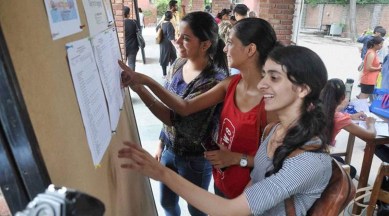Scholarships will aid DU diversity, colleges need to boost infra
"Unfortunately, we are losing out on many high-achieving women students from outside Delhi because we do not have a women’s hostel," said Hansraj College principal Dr Rama.

The diversity in the Delhi University of today goes beyond the numbers coming in from different parts of the country — women and persons from marginalised socio-economic backgrounds are increasingly making the journey to the university, college heads told The Indian Express.
“It’s quite a phenomenon actually. Universities have an important role to play in the process of social transformation. The increasing diversity on multiple levels we are experiencing accompanies an emphasis on increasing the gross enrollment ratio, and expansion through reservations. Even from Delhi, we have a large number of first-generation learners, but the expansion is creating more space for students of different backgrounds from elsewhere,” said prinicipal of Kirori Mal College, Dr Vibha Singh Chauhan.
monthly limit of free stories.
with an Express account.
Miranda House principal Dr Bijayalaxmi Nanda emphasised the importance of scholarships in furthering diversity in composition of colleges. Of the 3,326 undergraduate students in the college in 2018-2019, 451 were recorded as “economically backward” and 1,480 as “socially challenged” or belonging to the SC, ST and OBC categories. Of these, 410 received full fee reimbursement from either state or central governments, the institution or from private bodies.
Also Read | In top colleges, majority of students from outside capital — More to DU than D
“Our students from Telangana are being supported monetarily by their state government and that is perhaps the most important factor in the rising number of students from the state here. Our college offers a limited number of scholarships, some states like Telangana are offering some. Support, especially for those coming from outside, is important and more of it will further this change,” she said.
On more students making the journey from other states to her college over the last 10 years, Sri Venkateswara College principal Dr P Hemalatha Reddy said “greater accessibility, mobility and exposure” are key reasons.
However, principals also recognised shortcomings in what colleges offer at the moment. “Unfortunately, we are losing out on many high-achieving women students from outside Delhi because we do not have a women’s hostel — we only have a 200-seater men’s facility. The women who score high in the qualifying examinations are then looking at colleges which do offer them hostel seats,” said Hansraj College principal Dr Rama.
Across Delhi University colleges, shortage of hostel seats continues to be a challenge to the influx of women and economically and socially challenged students from outside Delhi. At the same time, mushrooming of paying guest facilities — both in North and South campuses — bears testimony to the ever-growing demand for accommodation facilities from “outstation students” against a limited supply from the university and colleges.